Writing
I write about libraries, technology, user research, and the internet. I link to almost everything I publish here. See also: blog
Questions about any of this? Email me or @ me.
Scholarly Publications
Forthcoming
Book chapter: Anantachai, T., Davis, R. C., Fabiku, A., and Maurer, N. “From Hire to Welcome: A Comprehensive Approach to Inclusive Onboarding.” Creating Healthy Library Workplaces: Five Factors That Improve Employee Engagement and Satisfaction. Bloomsbury Libraries Unlimited. (To be published in 2026)
Peer-Reviewed
Davis, R. C., Partlow, M., Pearce, D., and Sheffield, S. “Snippets, Subject Lines, and Exclamation Points: A Case Study in Constructing Better Library Emails.” Weave: Journal of Library User Experience 5.2 (2022). Web. Access: open access on weaveux.org • DOI: 10.3998/weaveux.1634
- Winner of the 2023 STARS Publication Recognition Award from the Reference and User Services Association (RUSA), a division of the American Library Association (ALA)
Davis, R. C. “Introducing First-Year and Transfer Students to a College Library With a Mystery From the Special Collections.” College & Undergraduate Libraries 26.4 (2019): 278-300. Web. Access: T&F free eprint • DOI:10.1080/10691316.2019.1695034
Invited
Davis, R. C., and Song, X. “Uncovering the Mystery of How Users Find and Use Ebooks Through Guerrilla Usability Testing.” Serials Review 46.3 (2020). Web. Access: T&F free eprint • Informal write-up on this project • DOI:10.1080/00987913.2020.1806648
Conference
Culler, T., Beswick, K., and Davis, R. C. “Ascending to New Heights: A Jumpstart Program to Prepare Students for Careers in Library Technology.” ACRL 2021 Proceedings (2021): 189–203. Web. Access: ACRL PDF
LibTech Insights posts (2023–present)
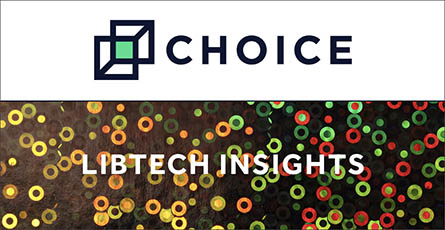
I write regular posts for a blog focused on technology in libraries and higher education. It’s published by Choice, a publishing unit of the Association of College & Research Libraries (ACRL), a division of ALA.
Davis, R. C. “Field Notes for a One-Person UX Team.” LibTech Insights, Choice (April 14, 2025). Web.
Davis, R. C. “5 Quick Tests to Run on Your Library Website.” LibTech Insights, Choice (February 10, 2025). Web.
Davis, R. C. “How to Interview Your Library’s Patrons.” LibTech Insights, Choice (January 6, 2025). Web.
Davis, R. C. “Top 5 Tips for Librarians Creating Surveys.” LibTech Insights, Choice (October 23, 2024). Web.
Davis, R. C. “How to Run a Space Observation Study at Your Library.” LibTech Insights, Choice (August 19, 2024). Web.
Davis, R. C. “How Archetypes Can Help Focus Your Library’s Website on User Needs.” LibTech Insights, Choice (July 1, 2024). Web.
Davis, R. C. “How to Future-proof Your Bibliographies Against Link Rot.” LibTech Insights, Choice (Feb. 26, 2024). Web.
Davis, R. C. “Crafting a Great Courtesy Notice: Email Formatting Tips.” LibTech Insights, Choice (Jan. 22, 2024). Web.
Davis, R. C. “How to Hold a Content Strategy Meeting.” LibTech Insights, Choice (Dec. 4, 2024). Web.
Davis, R. C. “How to get statistics about your institution’s accessibility needs.” LibTech Insights, Choice (Oct. 23, 2023). Web.
Davis, R. C. “Why you should ask users to test your website on their own devices.” LibTech Insights, Choice (Sept. 18, 2023). Web.
Davis, R. C. “How to host a website cleanup event.” LibTech Insights, Choice (Aug. 21, 2023). Web.
Davis, R. C. “How to make a bad web form.” LibTech Insights, Choice (June 12, 2023). Web.
Davis, R. C. “The value of live prototyping.” LibTech Insights, Choice (Apr. 24, 2023). Web.
Davis, R. C. “Use your reference interview skills to do user research.” LibTech Insights, Choice (Feb. 27, 2023). Web.
Davis, R. C. “Why you should think of stressed users as your default audience.” LibTech Insights, Choice (Jan. 23, 2023). Web.
Internet Connection column (2015–20)
Regular column for the scholarly journal Behavioral & Social Sciences Librarian.
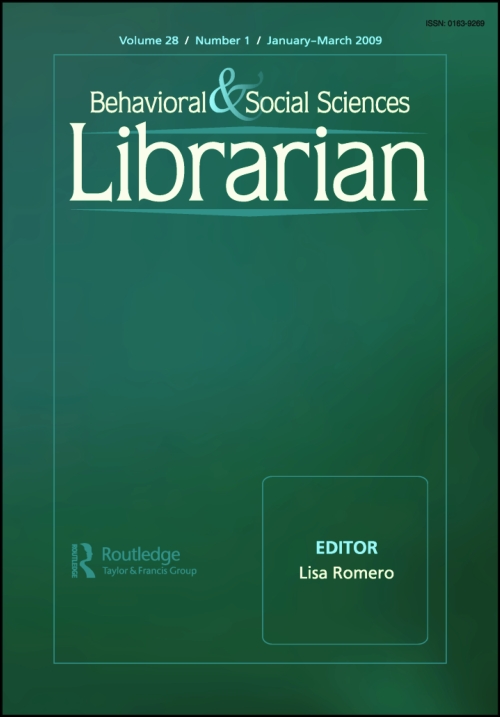
Davis, R. C. “AI and Libraries: Supporting Machine Learning Work (Internet Connection column).” Behavioral & Social Sciences Librarian 36.3 (2020). Web. Access: T&F free eprint • DOI:10.1080/01639269.2017.1771046
Davis, R. C. “Digital Privacy Resources for You, Your Library, and Your Library’s Patrons (Internet Connection column).” Behavioral & Social Sciences Librarian 36.2 (2019). Web. Access: NC State University Libraries repository • T&F free eprint • DOI:10.1080/01639269.2017.1696072 (Note: a duplicate of this article was published online due to a publisher’s error, so there’s a “retracted” version. Same content, just an accidental duplicate.)
Davis, R. C. “The LMS and the Library (Internet Connection column).” Behavioral & Social Sciences Librarian 36.1 (2018). Web. • Access: T&F (subscription required) or CUNY Academic Works • DOI:10.1080/01639269.2017.1387740
Davis, R. C. “APIs and Libraries (Internet Connection column).” Behavioral & Social Sciences Librarian 35.4 (2017): 192–195. Web. • Access: T&F (subscription required) or CUNY Academic Works • DOI:10.1080/01639269.2017.1283185
Davis, R. C. “The Future of Web Citation Practices (Internet Connection column).” Behavioral & Social Sciences Librarian 35.3 (2016): 128-134. Web. • Access: T&F (subscription required) or CUNY Academic Works (free) • DOI:10.1080/01639269.2016.1241122
Davis, R. C. “Hackathons for Libraries and Librarians (Internet Connection column).” Behavioral & Social Sciences Librarian 35.2 (2016): 87–91. Web. • Access: T&F (subscription required) or CUNY Academic Works (free) • DOI:10.1080/01639269.2016.1208561
Davis, R. C. “Annotate the Web: Four Ways to Mark Up Web Content (Internet Connection column).” Behavioral & Social Sciences Librarian 35.1 (2016): 46–49. Web. • Access: T&F (subscription required) or CUNY Academic Works (free) • DOI:10.1080/01639269.2016.1134233
Davis, R. C. “Synchronizing Oral History Text and Speech: A Tools Overview (Internet Connection column).” Behavioral & Social Sciences Librarian 34.4 (2015): 234-238. Web. • Access: T&F (subscription required) or CUNY Academic Works (free). • DOI:10.1080/01639269.2015.1098790
Davis, R. C. “Git and GitHub for Librarians (Internet Connection column).” Behavioral & Social Sciences Librarian 34.3 (2015): 151–164. Web. • Access: T&F (subscription required) or CUNY Academic Works (free). • DOI:10.1080/01639269.2015.1062586
Davis, R. C. “Teaching the Network: a Brief Demonstration of the Internet’s Structure for Information Literacy Instruction (Internet Connection column).” Behavioral & Social Sciences Librarian 34.2 (2015): 88-94. Web. • Access: T&F (subscription required) or CUNY Academic Works (free). • DOI:10.1080/01639269.2015.1042820
User research reports (2019–present)
I conduct user research at NC State University Libraries and sometimes write (or co-write) reports for publication on the Libraries website. Here are some of my favorite proejcts:
- Social media survey and talkback boards, February 2025
- Faculty Research Commons: Observation Study, Heat Maps, and Survey, October 2025
- Homepage Redesign 2023, May 2023
- Readability Widget: Tiny Café, September 2022
- Innovation Studio Usability Study, July 2021
- Identifying user needs through interviews and participatory prototyping, Spring 2020
View all user research reports at NC State University Libraries (I’m involved in a subset of these)
Thesis (2016)
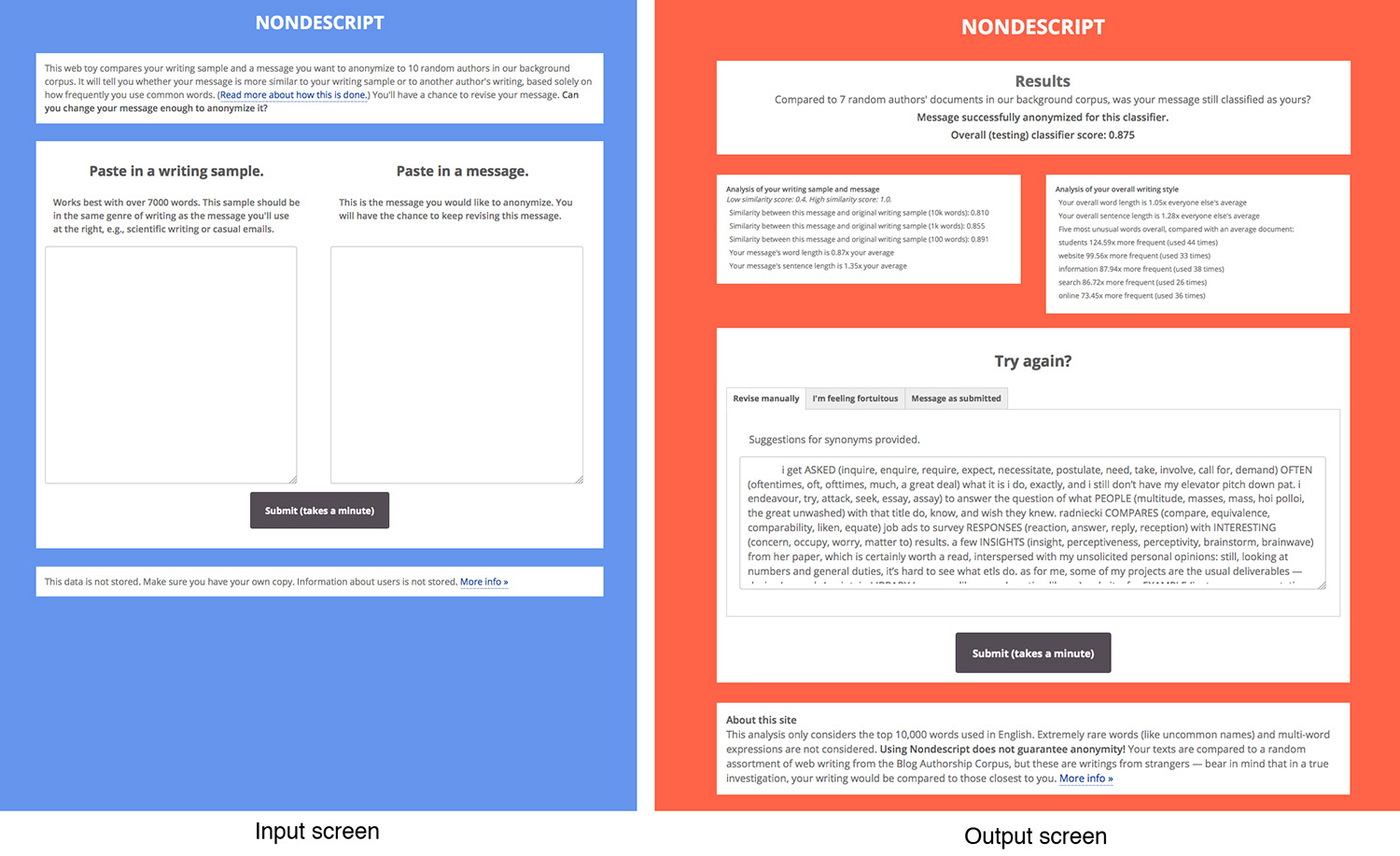 Nondescript: A Web Tool to Aid Subversion of Authorship Attribution. Abstract: A person’s writing style is uniquely quantifiable and can serve reliably as a biometric. A writer who wishes to remain anonymous can use a number of privacy technologies but can still be identified simply by the words they choose to use — how frequently they use common words like “of,” for instance. Nondescript is a web tool designed first to identify the user’s writing style in terms of word frequency from a given writing sample and document, then to suggest how the author can change their document to lessen its probability of being attributed to them. While Nondescript does not guarantee anonymity, the web tool provides a user with an iterative interface to revise their writing and see results of a simulated authorship attribution scenario. Nondescript also provides a synonym-replacement feature, which significantly lowers the probability that a document will be attributed to the original author. Code repository on GitHub.
Nondescript: A Web Tool to Aid Subversion of Authorship Attribution. Abstract: A person’s writing style is uniquely quantifiable and can serve reliably as a biometric. A writer who wishes to remain anonymous can use a number of privacy technologies but can still be identified simply by the words they choose to use — how frequently they use common words like “of,” for instance. Nondescript is a web tool designed first to identify the user’s writing style in terms of word frequency from a given writing sample and document, then to suggest how the author can change their document to lessen its probability of being attributed to them. While Nondescript does not guarantee anonymity, the web tool provides a user with an iterative interface to revise their writing and see results of a simulated authorship attribution scenario. Nondescript also provides a synonym-replacement feature, which significantly lowers the probability that a document will be attributed to the original author. Code repository on GitHub.
This thesis was submitted in May 2016 in fulfillment of a MA in Linguistics, with a focus on computational linguistics.
In 2017–18, I was awarded a small grant from the PSC-CUNY Research Award Program to continue working on this project, culminating in a user study. The results were published in a white paper, “Obfuscating Authorship: Results of a User Study on Nondescript, a Digital Privacy Tool” (available through CUNY Academic Works).
If on a winter’s night a library cardholder (2016)
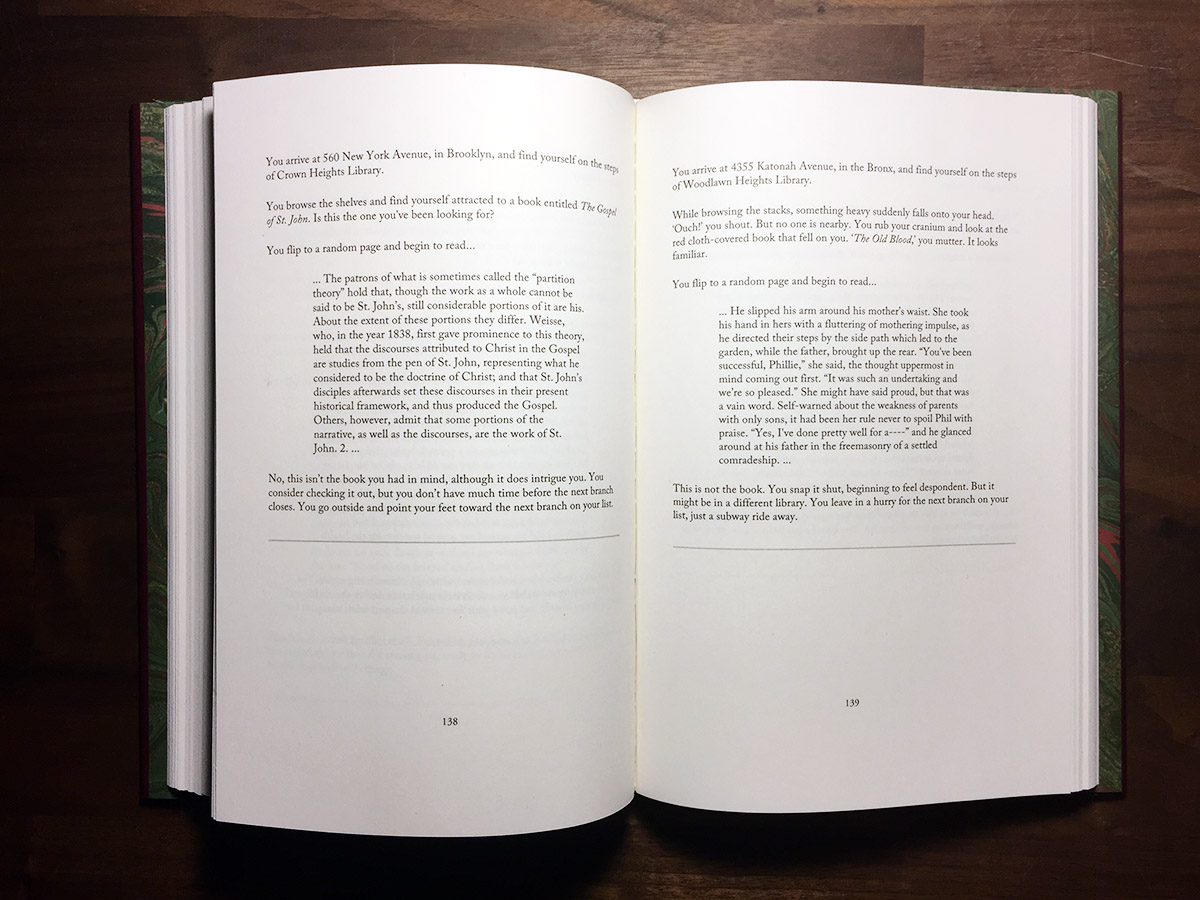 November is NaNoGenMo (National Novel Generation Month), in which participants computationally generate a 50k+-word novel. My 2016 project, If on a winter’s night a library cardholder, is inspired by If on a winter’s night a traveler by Italo Calvino. In it, you, the protagonist, half-remember a book you read long ago and want to read again — but you can’t remember the title. You visit each of the 216 library branches in New York City looking for it. At each library, you find a book that looks familiar and you read a page… Is this the book you’ve been trying to find? My Python script generates a new novel each time. I had my favorite iteration printed and bound.
November is NaNoGenMo (National Novel Generation Month), in which participants computationally generate a 50k+-word novel. My 2016 project, If on a winter’s night a library cardholder, is inspired by If on a winter’s night a traveler by Italo Calvino. In it, you, the protagonist, half-remember a book you read long ago and want to read again — but you can’t remember the title. You visit each of the 216 library branches in New York City looking for it. At each library, you find a book that looks familiar and you read a page… Is this the book you’ve been trying to find? My Python script generates a new novel each time. I had my favorite iteration printed and bound.
Other selected publications
Davis, R. C., and Mark Eaton. “Make a Twitter Bot in Python: Iterative Code Examples.” Journal of Interactive Technology and Pedagogy (Blueprints section). 12 Apr 2016. (Also available on CUNY Academic Works. Note that these instructions are now very outdated and probably do not work.)
Magnussen, L. and R. Davis. “Analyzing EZProxy Logs.” ACRL Tech Connect. Association of College & Research Libraries. 29 Oct. 2014.
Davis, R. C. “MLA 2014: A Quick Reflection.” dh+lib. Association of College & Research Libraries, Digital Humanities Interest Group. 5 Feb. 2014.
Davis, R. C. “Teaching & understanding digital literacy.” The Desk Set. 12 Sept. 2013.
Davis, R. C. “Saving the Smithsonian’s Web.” The Bigger Picture. Smithsonian Institution Archives. 25 Aug. 2011.
Davis, R. C. “Five Tips for Designing Preservable Websites.” The Bigger Picture. Smithsonian Institution Archives. 2 Aug. 2011.
Blog posts at Emerging Tech in Libraries, my CUNY Commons blog. 61 posts as of July 2016. (Now incorporated into my blog archive.)
Newsletter articles (2012–19)
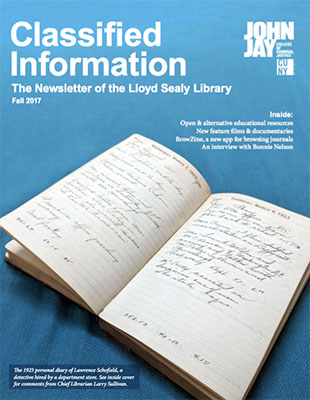 My former workplace, the Lloyd Sealy Library at John Jay College of Criminal Justice, publishes a 20-page newsletter each semester. It’s distributed in print to every faculty member and by email to every CUNY librarian. I edited, designed, and contributed content to the newsletter 2012–19. Articles I’ve penned include:
My former workplace, the Lloyd Sealy Library at John Jay College of Criminal Justice, publishes a 20-page newsletter each semester. It’s distributed in print to every faculty member and by email to every CUNY librarian. I edited, designed, and contributed content to the newsletter 2012–19. Articles I’ve penned include:
- The Pop-Up Library: Engaging with students beyond our walls, Spring 2018
- 150+ students “escape the library”, Fall 2017
- The Harlem Renaissance in Haaren Hall, Fall 2015
- Lightning usability testing with OneSearch (Primo), Spring 2015
- Just launched: the Lloyd Sealy Library Digital Collections, Spring 2014
- Short report: Early Modern Digital Agendas at the Folger, Fall 2013 (full newsletter PDF)
- From Wikipedia to the Lloyd Sealy Library, Spring 2013 (full newsletter PDF)